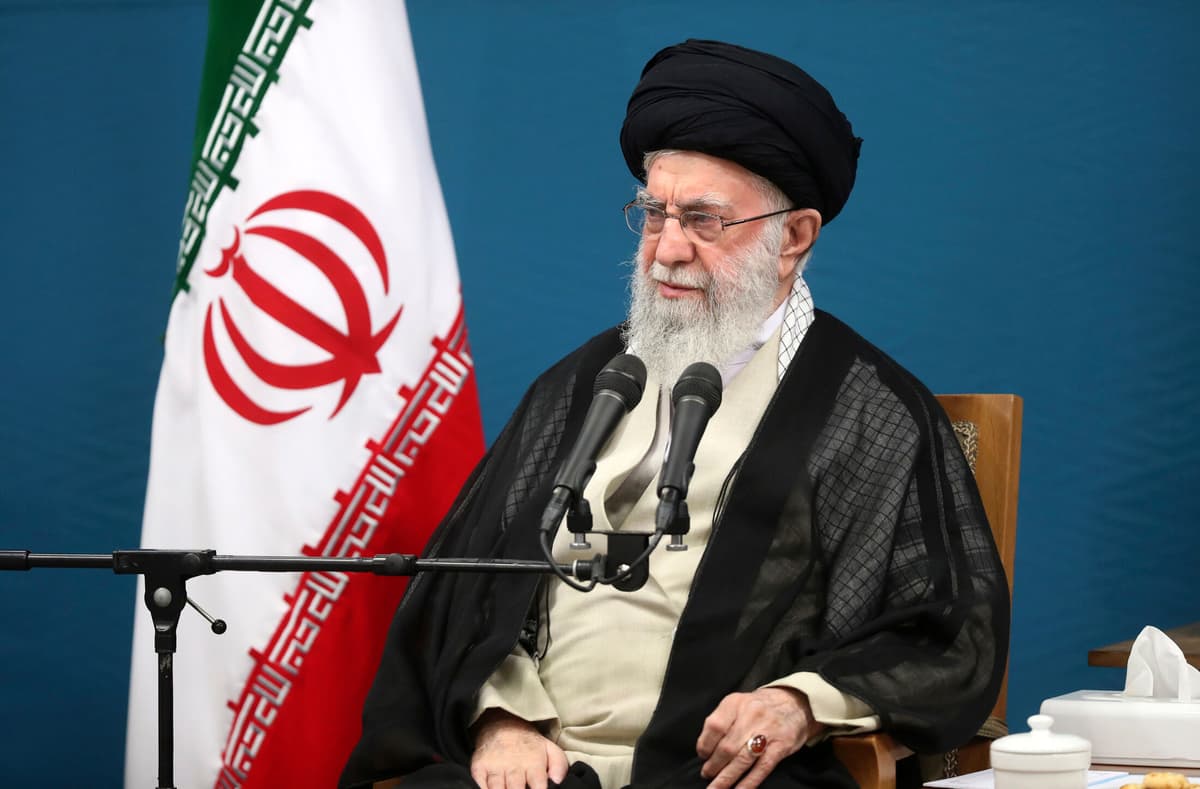Khamenei’s Diplomatic Gambit: Iran Ratchets Up Aggression While Ayatollah Signals Readiness To Negotiate
The Islamic Republic’s leadership seems to believe that if Vice President Harris wins in November, Iran doves will steer America’s Mideast policy.

Even as the Islamic Republic of Iran ratchets up aggression across the Mideast, its supreme leader is signaling readiness for negotiations with the “enemy” over a renewed, albeit ever-elusive nuclear deal.
Ayatollah Ali Khamenei’s statement Monday is raising hopes among Washington promoters of diplomacy with Tehran and those who constantly seek regime moderates to appease. The Islamic Republic’s leadership seems to believe that if Vice President Harris wins in November, that faction would steer America’s Mideast policy.
“We must not place our hopes in the enemy or wait for their approval for our plans,” Mr. Khamenei said at Tehran Tuesday while addressing the new cabinet of President Pezeshkian. “However, this does not contradict interacting with the same enemy in certain situations. There is no obstacle to this.”
The comment seemed to cheer up Washington advocates of diplomacy. “Important shift in Tehran, paving the way for direct US-Iran talks in 2025,” a vice president at Quincy Institute and a long time critic of American pressure on the Islamic Republic, Trita Parsi, writes on X. “Whether the U.S. will be serious remains to be seen (i.e. give & take talks).”
Diplomacy advocates were also encouraged by the presence of a familiar face among the cabinet members: two weeks after dramatically quitting government, a former foreign minister, Javad Zarif, who had been the public face of the talks that led to the 2015 Iran deal, is now back as Mr. Pezeshkian’s vice president for strategic affairs.
In reality, Mr. Khamenei’s statement and the reaction at Washington mean little, the policy director at United Against Nuclear Iran, Jason Brodsky, tells the Sun. “Whenever the Iranian leadership so much as smiles at the West, there’s a lot of irrational exuberance that develops, and I think we need to be a little more guarded about the statements that come out of Iran.”
It is unclear even whether Mr. Khamenei’s offer to “interact” refers to his regime’s nuclear dash. Last week foreign ministers Stephane Sejourne of France and David Lammy of Britain called their new Tehran counterpart, Abbas Araqchi. Conversations were reportedly mostly about reducing Mideast tensions while nuclear issues were deferred for a later date.
Mr. Araqchi’s threats to attack Israel aside, however, Iran is moving ever-closer to becoming a nuclear state. “There are a lot of suspicious activities that might not yet indicate an Iranian decision to break through to a nuclear weapon, but seem designed to shorten the process in case such a decision is made,” an Iran researcher at Tel Aviv University, Raz Zimmt, tells the Sun.
The Iranian top interest is to ease sanctions, Mr. Zimmt says. “They are seeking a sort of less-for-less: fewer sanctions in return for a minimal roll-back of the nuclear capabilities that they acquired in recent years. And in any case, we are not talking about a process that could start in earnest before the next administration is in power.”
For now, the Biden administration is keeping its distance from Mr. Khamenei’s latest gambit. “If Iran wants to demonstrate seriousness or a new approach, they should stop nuclear escalations and start meaningfully cooperating” with the International Atomic Energy Agency, the department of state said in a statement to the Associated Press.
Meanwhile, even if either President Trump or Ms. Harris is interested in negotiating, they would need to act fast. The so-called “snap-back” option, which could reimpose all international sanctions that existed proper to the 2015 nuclear deal, is set to expire by October of next year.
“I will never hesitate to take whatever action is necessary to defend our forces and our interests against Iran and Iran-backed terrorists,” Ms. Harris said last week while accepting the Democratic presidential nomination. Yet, she provided no details, and her top foreign policy adviser, Philip Gordon, is widely seen as an Iran dove.
Seeking to renew the nuclear deal, which Mr. Trump left in 2018, the Biden administration has allowed billions of dollars in sanctions-related frozen funds to be transferred to Iran. It argued that restrictions were set so the money could only be used for humanitarian purposes.
The Iranians “used the money for Houthis, they used it for Hamas, for Hezbollah, all these tunnels that were built in Gaza were all courtesy of the Iranians so that’s where the money went, straight to terrorism,” a former national security adviser under Mr. Trump, Robert O’Brien, told Fox News.
Now that the Islamic Republic’s investment in Mideast terrorism is setting the region ablaze, Ayatollah Khamenei is signaling he is ready for, once again, “interacting” on the nuclear file. Renewed American pressure might better curb Tehran’s ambitions, if the next president is inclined to use it.

